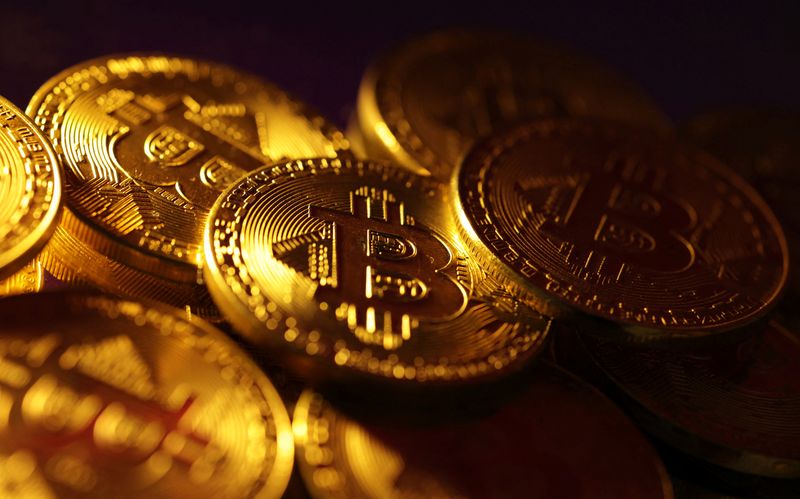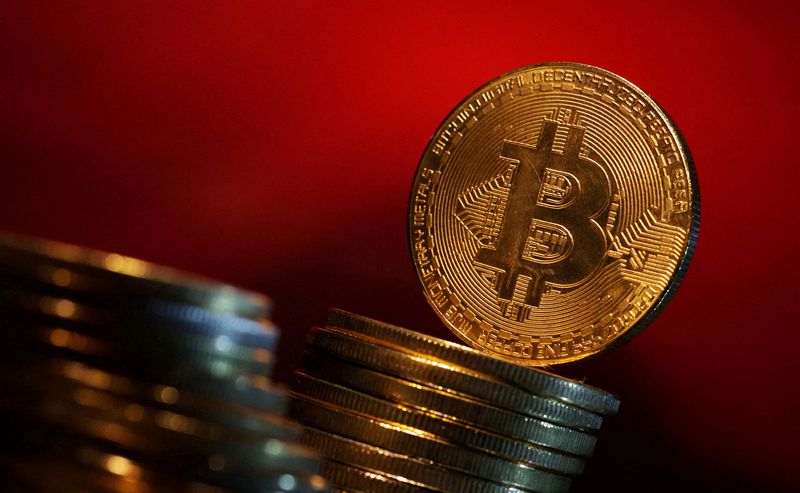LONDON (Reuters) - Bitcoin's long-anticipated 'halving' is, depending on where you sit, a vital event that will burnish the cryptocurrency's value as an increasingly scarce commodity, or little more than a technical change talked up by speculators to inflate its price.
The halving comes after bitcoin hit an all-time high of $73,803.25 in March.
But what exactly is the halving, and does it really matter?
WHAT IS IT?
The halving, which happens roughly every four years, the latest of which is expected this week, is a change in bitcoin's underlying blockchain technology designed to reduce the rate at which new bitcoins are created.
Bitcoin was designed from its inception by its pseudonymous creator Satoshi Nakamoto to have a capped supply of 21 million tokens.
Nakamoto wrote the halving into bitcoin's code and it works by reducing the rate at which new bitcoin are released into circulation.
So far, about 19 million tokens have been released.
HOW DOES IT HAPPEN?
Blockchain technology involves creating records of information - called 'blocks' - which are added to the chain in a process called 'mining'.
Miners use computing power to solve complex mathematical puzzles to build the blockchain and earn rewards in the form of new bitcoin.
The blockchain is designed so that a halving occurs every time 210,000 blocks are added to the chain, roughly every four years.
At the halving, the amount of bitcoin available as rewards for miners is cut in half. This makes mining less profitable and slows the production of new bitcoins.
(For a visual explanation of how blockchain works, click here.)
WHAT HAS IT GOT TO DO WITH BITCOIN'S PRICE?
Some bitcoin enthusiasts say that bitcoin's scarcity gives it value.
The lower the supply of a commodity, all other things being equal, the price should rise when people try and buy more. Bitcoin is no different, they argue.
Others dispute the logic, noting that any impact would have already been factored in to the price.
The supply of bitcoin to the market is also largely down to crypto miners but the sector is opaque, with data on inventories and supplies scarce. If miners sell their reserves, that could pressure prices lower.
Since hitting record highs last month, bitcoin's price has sunk below $64,000. JP Morgan analysts said this week they expect the price to fall further after the halving.
Establishing the reasons for a crypto rally is also hard, not least as there is far less transparency than in other markets.
The most common reason given for this year's surge is the U.S. Securities and Exchange Commission's January approval of bitcoin ETFs, and expectations that central banks will cut interest rates.
But in the speculative world of crypto trading, explanations for price changes can snowball into market narratives that become self-fulfilling.
WHAT ABOUT PREVIOUS HALVINGS?
There's no evidence to suggest that previous halvings have been behind bitcoin's subsequent price rises.
Still, traders and miners have studied past halvings to try and gain an edge.
When the last halving happened on May 11, 2020, the price rose around 12% in the following week and 659% in the following 12 months.
But there were many explanations for the rally - including loose monetary policy and stay-at-home retail investors with spare cash - and no real evidence the halving was behind it.
An earlier halving occurred in July 2016. Bitcoin rose around 1.3% in the following week, before plunging a few weeks later and then rallying.

In short: it's hard to isolate the impact, if any, halvings may have had previously or predict what could happen this time around.
Regulators have repeatedly warned that bitcoin is a speculative market driven by hype and one that poses harm to investors.
